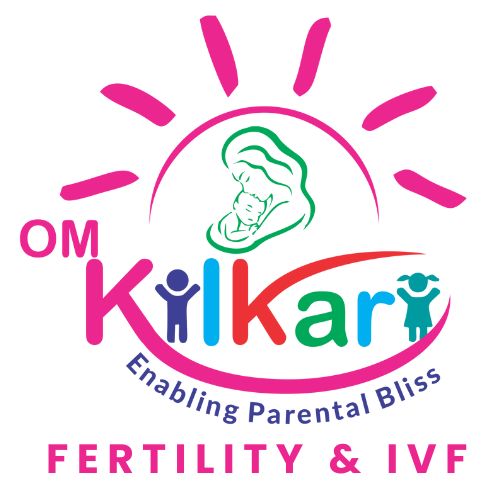
Introduction
When undergoing IVF (In Vitro Fertilisation), one of the most crucial decisions couples face is whether to opt for a fresh embryo transfer (ET) or a frozen embryo transfer (FET). Both techniques have been used successfully for decades, but depending on your medical condition, fertility history, and treatment plan, one may be more suitable than the other.
At OM Kilkari IVF Centre, we understand how overwhelming these choices can be. This blog will help you understand the key differences, pros and cons, and which option may be right for your journey to parenthood.
What Is a Fresh Embryo Transfer?
A fresh embryo transfer involves transferring embryos into the uterus within 3–5 days after egg retrieval and fertilisation. The embryo hasn’t been frozen or stored.
🔹 Pros of Fresh Embryo Transfer
- Shorter treatment timeline – No waiting period after retrieval.
- Fewer steps – No freezing or thawing process involved.
- Good for younger patients – Especially those with no history of IVF failure or hormonal issues.
🔻 Cons of Fresh Embryo Transfer
- It may affect the success rate if the woman’s body is still recovering from hormone stimulation.
- Not ideal if the uterine lining is not optimal during transfer.
- Not recommended in cases of OHSS (Ovarian Hyperstimulation Syndrome) risk.
What Is a Frozen Embryo Transfer (FET)?
In a frozen embryo transfer, embryos are created and then cryopreserved (frozen) for future use. Once the woman’s body has returned to a more natural hormonal state, these embryos are thawed and transferred in a later cycle.
🔹 Pros of Frozen Embryo Transfer
- Higher implantation success rates in many cases.
- More time for the uterus to prepare for pregnancy.
- Ideal for women with PCOS, high hormone levels, or risk of OHSS.
- Allows for genetic testing (PGT-A/PGD) before implantation.
🔻 Cons of Frozen Embryo Transfer
- Longer overall treatment time.
- Although modern vitrification techniques have made it very safe, there is a slight risk during the thawing process.
- An emotional waiting period between egg retrieval and transfer.
Success Rates: Fresh vs. Frozen Embryo Transfers
Research shows that frozen embryo transfers now have equal or even better success rates compared to fresh transfers, particularly in women under 35 or those with certain hormonal imbalances.
| Factor | Fresh Transfer | Frozen Transfer |
|---|---|---|
| Success Rate (on avg.) | 35–45% | 40–55% |
| Uterine Environment | Less controlled | More optimized |
| Hormone Recovery | Ongoing during transfer | Fully recovered |
| Suitable for High Responders | ❌ No | ✅ Yes |
At OM Kilkari IVF, we analyse your hormonal levels, egg quality, and endometrial health before recommending which method is most appropriate.
When Is Fresh Embryo Transfer Recommended?
Fresh transfer may be preferred when:
- You have excellent egg quality and young age.
- Your hormone levels are well balanced.
- There’s no risk of OHSS or other complications.
When Is Frozen Embryo Transfer Recommended?
FET is usually recommended if:
- You’re at risk of OHSS.
- You have elevated estrogen or PCOS.
- You want to genetically screen embryos.
- You’ve had unsuccessful fresh transfers before.
How Do I Choose the Right Option?
The decision between fresh vs. frozen embryo transfer depends on several individual factors:
- Age and fertility history
- Hormonal profile
- Response to ovarian stimulation
- Number and quality of embryos
- Medical conditions like endometriosis or PCOS
At OM Kilkari IVF Hospital, our fertility specialists guide you through every step of the IVF process, using evidence-based methods to increase your chances of a healthy pregnancy.
🌼 Final Thoughts: Fresh or Frozen – It’s About What’s Right for YOU
Choosing between a fresh and frozen embryo transfer is a personalized medical decision. While frozen transfers are gaining popularity due to improved success rates and flexibility, fresh transfers still offer advantages in certain cases.
Our team at OM Kilkari IVF Centre is committed to helping you make the most informed decision for your family-building journey.
🔍 FAQs
Q1: Is frozen embryo transfer more successful than fresh?
👉 Yes, in many cases, especially when the body needs time to recover from stimulation drugs.
Q2: Can I choose to freeze embryos even if fresh transfer is possible?
👉 Yes, your fertility doctor may recommend it based on your health profile.
Q3: Does FET increase chances of twins?
👉 It depends on how many embryos are transferred. We usually recommend single embryo transfer (SET) for safety.
